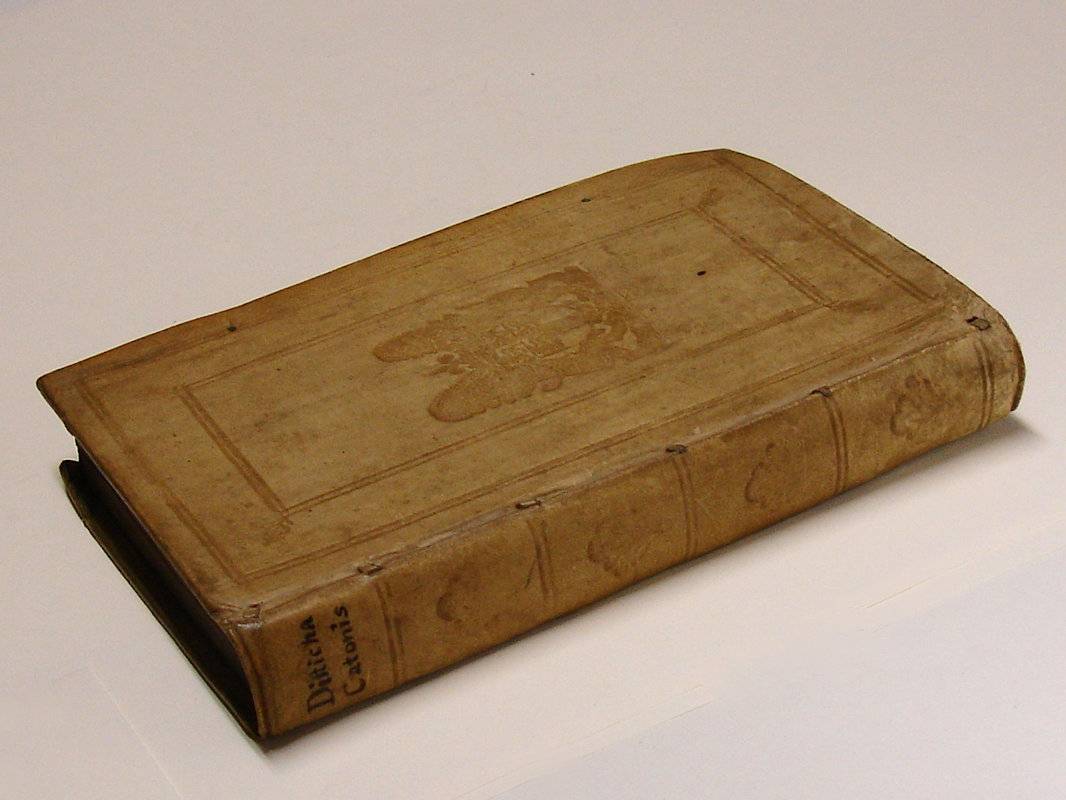CATO.
Dionysii Catonis Disticha de moribus ad filium, praeter sedulam variantis lectionis per omnia conlationem, lectissimis etiam adornata flosculis poeticis, una cum singulis adposita distichis, binorum quoque versuum, idiomatum vero diversorum, interpretatione quincuplice. Adjecta sunt lemmata Catoniana, suis quaeque restituta distichis. (And:) Historia critica Catoniana, per singulorum seriem consuetam, Dionysii Catonis Distichorum ex ordine deducta. Cui praemittuntur Maximi Planudis Metaphrasis Graeca, cum castigationibus Josephi Scaligeri in eamdem perpetuis: itemque Desiderii Erasmi concinna expositio. Adnexae sunt (...) Barthii, Opitii, Daumii, Wachii, Boxhornii, Cannegieteri, Withofii & Arntzeniorum fratrum animadversiones selectae. Addita quoque ad calcem Distichorum cuique nova paraphrasis.
Amsterdam (Amstelaedami), Apud Franciscum Houttuyn, 1759.
8vo. 2 volumes, in different bindings: Volume 1, vellum & 21 cm: XVI,348 p., 5 engraved plates, including the frontispiece. Volume 2 contemporary wrappers & 22 cm: X,640,(24 index) p., frontispiece. (
Ref: Volume 1: STCN ppn 184816912; ; Spoelder p. 661, Rotterdam 1. Volume 2: STCN ppn 184816696. Volume 1 & 2: Schweiger 2,70/71; Brunet 1,1668; Graesse 2,82; Ebert 3737) (
Details: Ad 1: a vellum bound prize copy, but without the prize. Boards with gilt double fillet borders, and the coat of arms of Rotterdam in the center. The frontispiece and one of the plates (no. 4) are skillfully handcoloured. The frontispiece depicts the presenting of a scroll with his 'morum praecepta' by Epictetus to Cato. STCN describes a copy that also has a handcoloured frontispiece. Ad 2: Margins uncut. The frontispiece depicts a scholar in his study; he wears a dressing gown. This volume contains the dedication leaf to the German jurist 'Gustavus Georgius Koenig a Koenigsthal', 1717-1771, which is lacking in most copies. Gustaf Georg König von Königsthal, was 'Ratskonsulent' at several German courts. Ad 1 & 2: Both title pages printed in red and black. The frontispieces and plates are engraved by S. Fokke) (
Condition: Ad 1: Vellum age-toned. Gilt fading. All 4 textile fastening ties are gone. Name cut from the upper corner of the front flyleaf. Right upper corner of last 60 p. very slightly warped by moist. Ad 2: Binding worn and scuffed; paper on back partly gone. Stamp on the front flyleaf) (
Note: 'The Distichs of Cato (Latin: Catonis Disticha), is a Latin collection of proverbial wisdom and morality by an unknown author commonly named Dionysius Cato, from the 3rd or 4th century AD. The 'Catonis Disticha' was the most popular medieval schoolbook for teaching Latin, prized not only as a Latin textbook, but also as a moral compass.' Cato was in use as a Latin teaching aid until the end of the 18th century (...). 'It was one of the best-known books in the Middle Ages and was translated into many languages'. (Wikipedia s.v. 'Distichs of Cato')
§ Together both volumes here on offer form an ambitious Cato edition, numbering ca. 1000 pages in total. It is produced by an anonymous editor. It is the editor's ambition to show that there is more in the 'Disticha Catonis' than meets the schoolboy's eye. He also wants to remove the school squalor of ages. Underneath the 'disticha' lies hidden, he tells us, much 'utilitas' and 'elegantia'. (Volume 1, preface p. VII) The first volume contains the Latin text, immediately followed by translations into Greek (Scaliger), English, German (Opitz), Dutch and French. The proverbs/maxims in English, Dutch and French are 'in versione (...) nova'. (Idem p. X) After these five translations follows a number of 'flosculi poetici', on the same subject or in the same key as Cato's proverb/maxim, selected from ancient poets and Neolatin poets.
§ The second volume contains a voluminous commentary, a Greek translation of Planudes, and explanations and observations of the anonymous editor and of earlier leading commentators, among whom Erasmus and Scaliger. The anonymous editor is according to most bibliographers, among them Brunet, Ebert and Graesse, one König von Königsfeld. On what grounds is not clear. As it happens, one Gustavus Georgius Koenig von Koenigsthal is, as told above, the dedicatee of the second volume. In the 'Göttingische Anzeigen von gelehrten Sachen' (Volume 34) 1784, König von Königsfeld is already (erroneously) mentioned as the editor. However, no König von Königsfeld seems to have existed. So, this must be an error. In the 'Lexicon verstorbener baierischer Schriftsteller des 18. und 19. Jahrhunderts' of Clemens-Alois Baader (Augsburg/Leipzig, 1824, p. 290/92) it is stated that one Christian Gottlieb König, 1711-1782, is the editor. That he was indeed the editor was convincingly proven by the Dutch 'Catonis Disticha'-specialist M. Boas in an interesting 'whodunit' article. ('Anonymus Amstelodamensis Catonianus', in 'Twee en dertigste Jaarboek van het Genootschap Amstelodamum' , Amsterdam 1935, p. 147-203) Christian Gottlieb König was born in Altorf in 1711, was appointed in 1734 professor of philosophy at the university of Giessen, and became later 'Privatdozent' and Lutheran minister. In 1747 he moved to Amsterdam where he lectured privately Greek, Latin and Hebrew. In 1766 he accompanied as a mentor the 15 years old Immanuel Capadoce, of Portugese Jewish origin, who went to Leiden to study medicin. He died in Leiden in 1782. (The article on Koenig in NNBW 10, p. 476/78 is based on Boas) (
Provenance: Ad 2: Stamp of 'Bibliotheca Seminarii Culemborgensis' on front flyleaf) (
Collation: *8 (pi1 = frontispiece after leaf *1), A-X8, Y6). Asd 2: *4 (after leaf *1 leaf pi1 (= frontispiece); after leaf *2 leaf 2pi1 (= dedication leaf)), A-28, 2T4. Frontispiece after leaf *1)) (Photographs on request)
Book number: 130116 Euro 425.00
Keywords: (Oude Druk), (Rare Books), Latin literature, Prize copy, Prize copy Rotterdam, Sentenzen, Sprichwörter, proverbs, römische Literatur, sententiae
 CATO.
CATO.